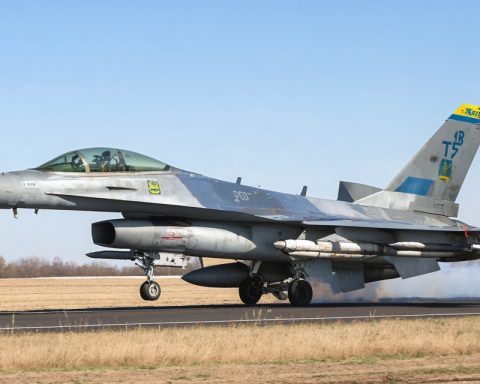Entering a New Epoch in Military Aviation
In a landmark shift, Germany is overhauling its defense architecture with the acquisition of the state-of-the-art F-35A Lightning II fighter jets. This daring leap into the future marks not just an upgrade in hardware but signals a profound transformation in Germany’s military strategy, focusing on increased efficiency and technological superiority over its aging Tornado fleet.
Blending Technology with Stealth
The introduction of the F-35A into Germany’s arsenal is a testament to the evolving dynamics of military aviation. Boasting unparalleled stealth capabilities and advanced sensor suites, these jets are designed to integrate seamlessly into NATO’s strategic fabric. Beyond their nuclear capability, these aircraft symbolize a leap forward in military intelligence, surveillance, and reconnaissance missions, setting a new standard for air power.
Significant Fiscal Commitment
Supported by the newly established “Bundeswehr Special Fund,” this initiative represents a nearly ten billion euro investment into the future of defense. The careful budget allocation not only covers the procurement of the aircraft but also includes comprehensive support systems, ranging from spare parts and weapons to a robust five-year logistics framework. This fund underscores Germany’s commitment to maintaining a formidable and modern military force.
Preparing for Tomorrow’s Warfare
The arrival of the F-35A is on a meticulously crafted timeline. With training operations slated to begin at the Ebbing Air National Guard Base, the transition paves the way for the jets’ deployment at Büchel Air Base by 2027. This plan ensures a smooth phasing out of Tornado aircraft by 2030, integrating cutting-edge aviation solutions into Germany’s defense strategy.
Global Innovations Redefining Combat
Lockheed Martin’s success with over 1,080 F-35 jets globally fortifies the aircraft’s reputation as a leading force in modern military aviation. With 950,000 accumulated flight hours, the F-35 is shaping global air combat dynamics, offering unparalleled insights and opportunities for enhancement in future military engagements.
Agenda for the Future
The inclusion of the F-35A is a precursor to a new era of technological advancement in military operations. By embracing versatility and innovation, Germany not only augments its own defense strategy but also plays a pivotal role in reshaping international security paradigms, anticipating a future where advanced technology becomes integral to combat strategies on a global scale.
Germany’s F-35 Acquisition: A Game-Changer in Military Aviation
Harnessing Advanced Features of the F-35
Germany’s acquisition of the F-35A Lightning II fighter jets represents a monumental transformation in its national defense strategy. The F-35 is renowned for its stealth technology, allowing it to operate undetected by enemy radar systems. Its advanced sensor systems provide comprehensive situational awareness, offering a significant tactical advantage in modern warfare scenarios. This integration of cutting-edge technology signifies a shift towards more sophisticated and efficient military capabilities.
Comprehensive Investment and Support
To ensure the successful deployment and maintenance of the F-35 fleet, Germany has established the “Bundeswehr Special Fund,” allocating nearly ten billion euros for procurement and associated support systems. This strategic investment not only encompasses the purchase of the aircraft but also covers critical elements such as spare parts, weaponry, and a robust logistics infrastructure. Such financial backing highlights Germany’s dedication to establishing a state-of-the-art defense force.
Strategic Training and Deployment Plans
As part of a well-structured introduction, Germany plans to commence training operations at the Ebbing Air National Guard Base. This initiative is set to facilitate the deployment of the F-35A at Büchel Air Base by 2027. The phased approach allows for a systematic transition from the Tornado jets, ensuring minimal disruption to current defense operations while enhancing overall military readiness for the anticipated winds of change by 2030.
Global Impact of F-35 Innovations
Globally, the F-35 program, spearheaded by Lockheed Martin, continues to redefine air combat with its widespread adoption exceeding 1,080 aircraft delivered. These jets have collectively flown over 950,000 hours, providing valuable insights into the evolution of military aviation. Such extensive operational experience is instrumental in driving further innovations and setting benchmarks for future enhancements in combat technology.
Influence and Future Directions
Germany’s embrace of the F-35 not only strengthens its national defense but also signals a collaborative step forward in international security efforts. This move aligns with a broader international trend where advanced combat technology plays a crucial role in shaping strategic defense initiatives. As technology continues to evolve, Germany’s commitment to integrating these advancements ensures its pivotal role in global military operations and preparedness for future conflicts. For more detailed information on the F-35 and its global impact, visit Lockheed Martin.







